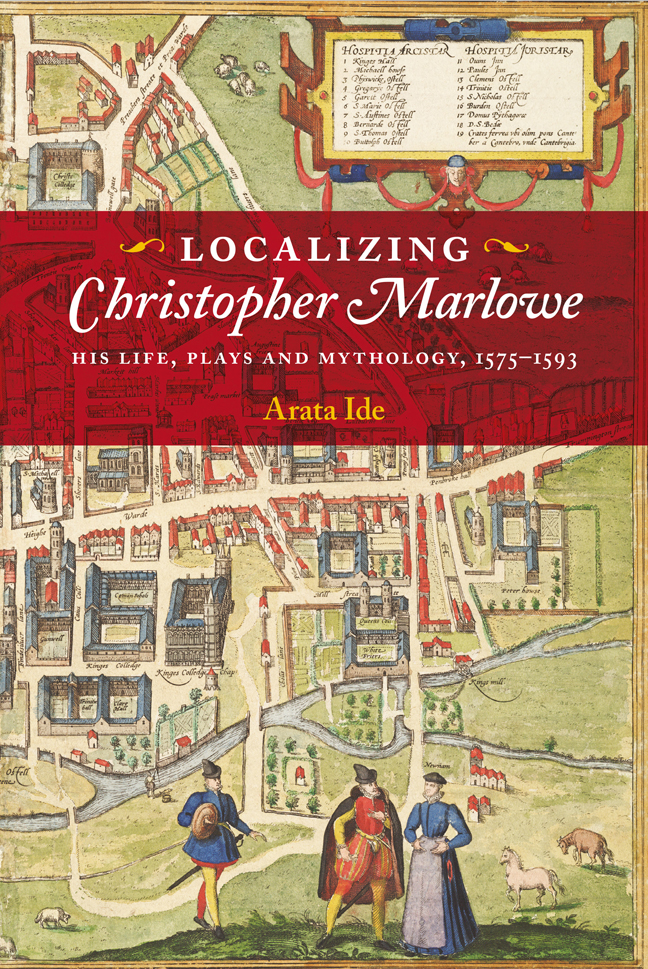Book contents
- Frontmatter
- Dedication
- Contents
- List of Illustrations
- Acknowledgements
- List of Abbreviations
- Timeline
- Note for the Reader
- Introduction
- Part I Life
- Part II Plays
- Part III Myths
- Conclusion
- Appendix 1 Transcript of the plan in Norfolk Record Office, NRS 23372, Z99
- Appendix 2 Transcript of the plan in Corpus Christi College Archives, CCCC08/28
- Appendix 3 Transcript and translation of the John Marley vs Nevell Hayes case
- Appendix 4 List of Foundation Scholars of Corpus Christi College, 1573–87
- Bibliography
- Index
- Miscellaneous Endmatter
9 - Robert Greene on Marlowe's Atheism
Published online by Cambridge University Press: 22 February 2024
- Frontmatter
- Dedication
- Contents
- List of Illustrations
- Acknowledgements
- List of Abbreviations
- Timeline
- Note for the Reader
- Introduction
- Part I Life
- Part II Plays
- Part III Myths
- Conclusion
- Appendix 1 Transcript of the plan in Norfolk Record Office, NRS 23372, Z99
- Appendix 2 Transcript of the plan in Corpus Christi College Archives, CCCC08/28
- Appendix 3 Transcript and translation of the John Marley vs Nevell Hayes case
- Appendix 4 List of Foundation Scholars of Corpus Christi College, 1573–87
- Bibliography
- Index
- Miscellaneous Endmatter
Summary
‘THE ATHEIST TAMBURLAN’
The considerable impact of Tamburlaine, which astonished audiences in the 1580s, is well attested by the abundant contemporary references to the play. Its success earned Marlowe both rivals and admirers in the stage business. Robert Greene may have been one of those envious of Marlowe's success. Greene appears to have initially been favourably inclined towards Tamburlaine as a historical figure. In Mamillia, published in 1580 – that is, before hearing Tamburlaine's verses ringing upon the public stage – Greene had recognized him as ‘Prince Tamberlane, the most bloody butcher in the world, [who] neuer shed blood, where there was submission’. In the preface written to the readers of Perimedes the Blacksmith (1588), however, Tamburlaine, and the manner in which he was portrayed on the stage, seems to have become a cause of intense irritation to him. Responding to the ‘two Gentlemen Poets’ who collaborated in a play to mock Greene's skill at writing tragic verse, Greene expressed his contempt for using a bombastic style: ‘I could not make my verses iet vpon the stage in tragicall buskins, euerie worde filling the mouth like the faburden of Bo-Bell, daring God out of heauen with that Atheist Tamburlan, or blaspheming with the mad preest of the sonne’ (vol. 7, pp. 7–8).
Here we see that Greene nurtured a grudge against a peer group of play-wrights who emulated such ‘intollerable poetrie: such mad and scoffing poets, that haue propheticall spirits, as bred of Merlins race’. The failure of his own play, Alphonsus (c.1587), a blank-verse imitation of Tambur-laine, was possibly one of the causes of his frustration and the butt of the ‘gentlemen’ poets’ ridicule. This disgrace seems to have been so humiliating that Greene took to slandering not just the tremendously popular play but the author of Tamburlaine himself. His innuendo about ‘Merlin’ clearly identifies Marlowe as author and prime mover of the innovation in heroic tragedy and sets him as his ultimate target. Although it is up for debate whether ‘the mad preest of the sonne’, Tamburlaine's equal in blasphemy, can be identified as a real person or as a character of the lost play, undoubt-edly Greene aligns the ‘atheist’ Tamburlaine with his creator to suggest that Marlowe shares the protagonist's blasphemous attitude towards God.
The unusual reference to Marlowe naturally drives us to question why Greene employed such a peculiar phrase as ‘that Atheist Tamburlan’.
- Type
- Chapter
- Information
- Localizing Christopher MarloweHis Life, Plays and Mythology, 1575-1593, pp. 267 - 295Publisher: Boydell & BrewerPrint publication year: 2023

